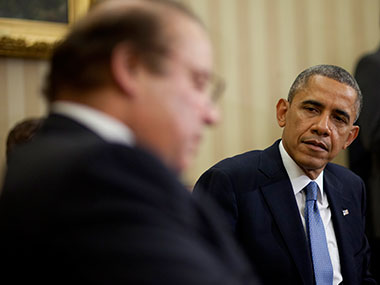On 23 October, 2013, when Sharif met Barrack Obama in Washington to try and reboot his country’s equation with the US, he was barely audible while speaking his mind. At a press conference, with Obama by his side, Sharif requested the US to stop drone attacks on terror outfits in Pakistan in a tone so feeble that almost everybody in the room found it difficult to hear him. But on Saturday, when Obama called Sharif soon after announcing his decision to visit India on January 26, the Pakistan government grandly announced that it had asked the putative Indian guest to raise the issue of Kashmir during his visit. Sharif has finally found his voice. But will he be heard this time? Fundamentally, there must be something wrong with the mindset of a country that advises another country’s President on what to say while visiting some other nation, albeit a neighbouring one in this case. Under normal circumstances, this choice is left to the guest and the host. India would have sound stupid if it were to advise Sharif on what to discuss with the Chinese premier, for example. But the India-Pakistan equation is different and such rules of diplomatic civility do not apply here. Also, Pakistan looks up to the US as a big brother whom it can approach and ask to intervene in disputes that its politicians are not capable of addressing. So no one can blame Pakistan for asking Obama to ratchet up the heat on Kashmir, especially when Sharif’s initial bon homie with Narendra Modi has degenerated into acrimony and the Valley has fallen off the table as a subject of dialogue between the two neighbours with no future parleys in sight. [caption id=“attachment_1816233” align=“alignleft” width=“380”] US President Barack Obama with Pakistan Prime Minister Nawaz Sharif. AP/File photo[/caption] In the past, visiting US Presidents have tactfully referred to Kashmir in their speeches. In 2000, Bill Clinton had called South Asia one of the most dangerous places on earth due to the conflict between the two neighbours. But Obama may be far less inclined to do Sharif’s bidding. First, Obama would not like to pour water over Modi’s enthusiasm for the United States. By breaking from tradition and inviting a US president for Republic Day celebrations, Modi has shown a clear pro-US tilt in Indian foreign policy. From the sullen and vitriolic relation between Richard Nixon and Indira Gandhi—the former had called the then Indian PM an ‘old witch’—to the time when the US had threatened to intervene on behalf of Pakistan in the 1971 war to the recent Devyani Khorbagade row, the relationship between the two nations has been uneven, to say the least. Though India moved closer to the US under Manmohan Singh—the nuclear deal being the high point of the Bush-Manmohan partnership—the ties have shown the two-step-forward-one-backward progress typical of two countries with a chequered history. But now that Modi has taken a bold, decisive step towards the US, Obama may also steer from tradition and ignore Sharif’s advice and keep Kashmir off the table. Bringing up the subject at a ceremonial event like the R-Day would achieve little, and instead leave a bad taste. Obama is now being seen as a lame duck President at home, but as with all outgoing presidents, he is determined to leave some kind of legacy. He is hardly likely to waste energy on deluded plans of resolving the Kashmir issue, or even attempting a dramatic breakthrough. Instead of squandering energy on an intractable issue, Obama may focus on some clear deliverables with India: better trade ties, climate control pacts and resolution of pending bilateral issues. There is now a clear shift in the power equation in South Asia. Since the 9/11 attack on the US and the American strike on Osama bin Laden’s hideout, the mistrust between Pakistan and the United States has grown. But their ties have survived primarily because of US interests in Afghanistan and Pakistan’s desire to not push its partners into India’s waiting arms. In India, on the other hand, the mood has changed considerably since the heydays of Cold War when the US was seen as an adversary and the Soviets as friends. On the ground, the mood is heavily pro-America. So, no Indian leader is likely to steer his country away from the current pro-Washington tilt. The US knows it can’t risk losing the goodwill of a country by needling it unnecessary on the Kashmir issue to mollify Pakistan. Obama could well be the first US President to accept this reality.
Obama is now being seen as a lame duck President at home, and he is hardly likely to waste energy on deluded plans of resolving the Kashmir issue.
Advertisement
End of Article


)

)
)
)
)
)
)
)
)



